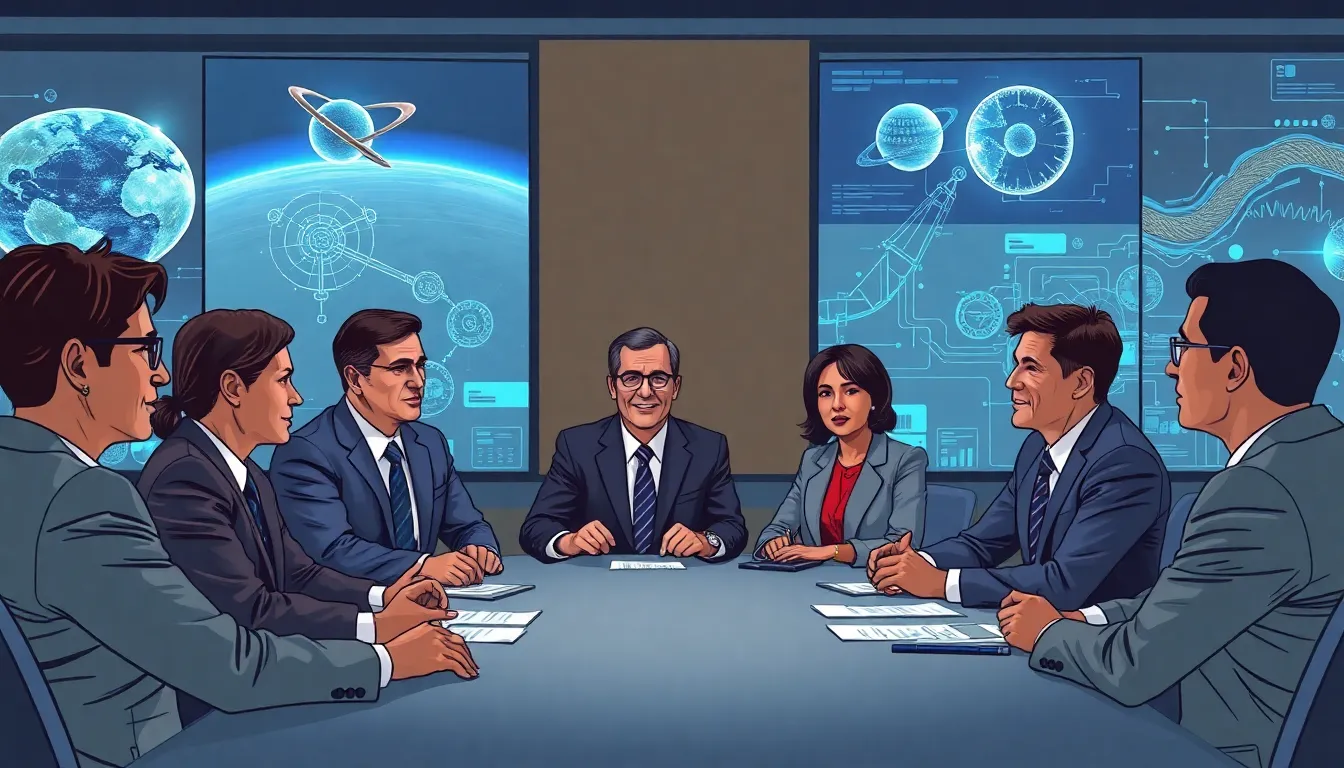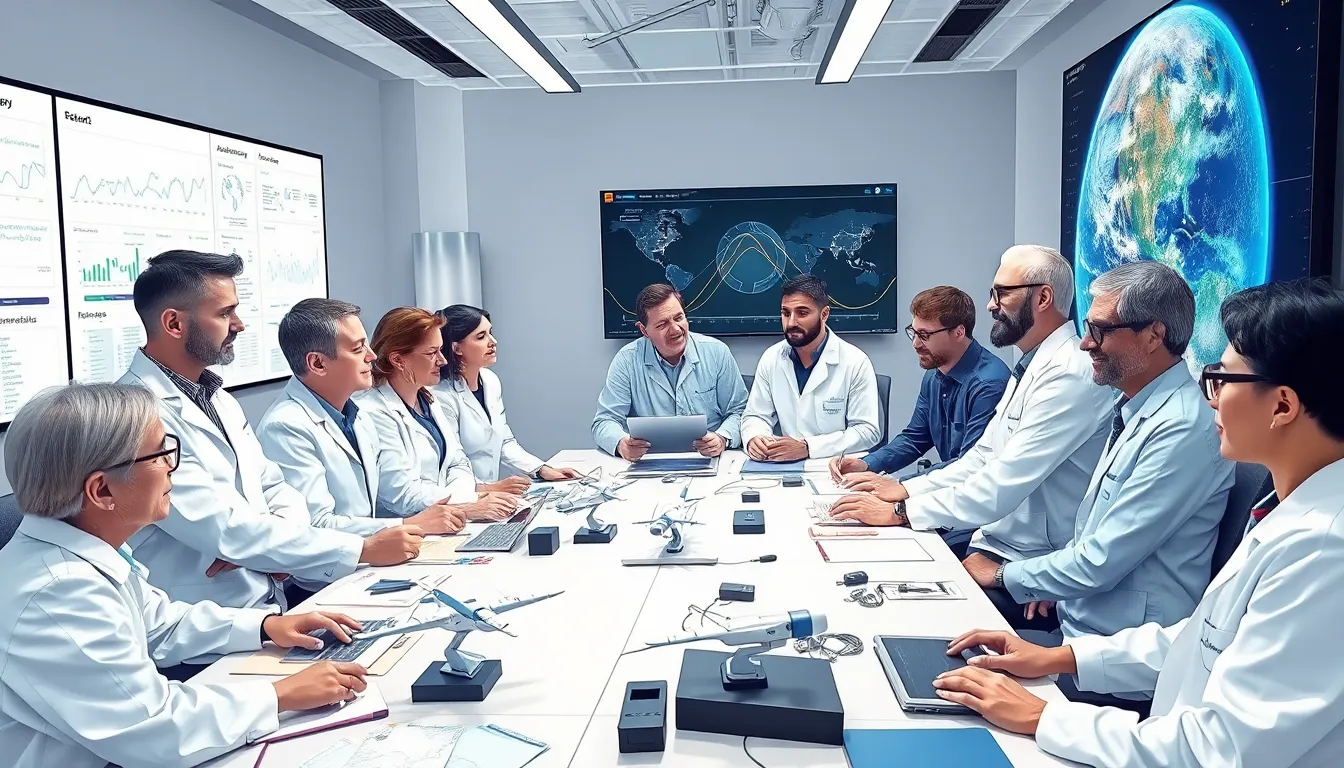In a world where science fiction is becoming science fact, the Science Space and Technology Committee stands at the forefront of innovation. This committee isn’t just a bunch of lab coats and pocket protectors; it’s a dynamic team of visionaries dedicated to exploring the uncharted territories of technology and space. They’re the ones who ensure that the next generation of gadgets doesn’t just make life easier but also pushes the boundaries of human capability.
Imagine a place where the brightest minds converge to debate the next big leap in space exploration or the latest tech trends. That’s the Science Space and Technology Committee for you! With a mission to propel society into a future filled with possibilities, they’re not just keeping up with the times—they’re setting the pace. Buckle up as we dive into the fascinating world of this committee and discover how they’re shaping our tomorrow.
Table of Contents
ToggleOverview of Science Space and Technology Committee
The Science Space and Technology Committee stands at the forefront of innovation, focusing on critical advancements in diverse fields. Members consist of experts who contribute unique perspectives and insights into technology and space exploration. Each contribution drives exploration of emerging trends and their implications for society.
The committee’s initiatives encompass a wide array of projects. These projects investigate cutting-edge technologies, fostering collaboration among scientists, engineers, and policymakers. By prioritizing research and development, the committee addresses both current and future challenges in these sectors.
Members frequently engage in discussions about policy recommendations. These recommendations promote sustainable practices in space missions and technological implementations. Through strategic partnerships with organizations and government entities, the committee enhances its influence on space exploration and technology.
They organize workshops and conferences that bring together industry leaders. These events facilitate the exchange of ideas and promote networking opportunities among stakeholders. By sharing knowledge, the committee helps shape policies that govern space and technology sectors.
Analyzing data and trends is another vital aspect of the committee’s work. It utilizes research findings to inform decision-making processes and ensure alignment with societal needs. The commitment to continuous learning drives the committee’s efforts in adapting to rapid changes in technology and space exploration.
Overall, the Science Space and Technology Committee exemplifies an unwavering dedication to advancing human potential. Through collaboration and innovation, it shapes the future landscape of technology and space, addressing challenges while harnessing opportunities for growth.
Key Responsibilities

The Science Space and Technology Committee undertakes several key responsibilities to advance innovation and ensure effective governance. These tasks align with its mission to enhance human potential through technology and space exploration.
Legislative Functions
Legislative functions involve crafting and reviewing policies that shape the landscape of technology and space initiatives. Members propose bills aimed at funding research projects, supporting education in STEM fields, and fostering international cooperation in exploration. They identify emerging technological trends and assess their implications for society. Collaboration with various stakeholders enables the committee to create comprehensive legislation, promoting sustainable practices. As a result, these efforts support innovation and the development of critical infrastructure in space exploration and technology sectors.
Oversight of Agencies
Oversight of agencies ensures effective execution of laws and policies within the committee’s jurisdiction. The committee monitors various federal agencies responsible for technology and space initiatives, evaluating their performance and resource allocation. Regular assessments and reports highlight compliance with established goals and objectives. Engaging with agency leaders allows for constructive feedback and drives improvement in program effectiveness. The oversight function helps to identify challenges, ensuring that agencies adapt to evolving technological landscapes while promoting transparency and accountability.
Major Areas of Focus
The Science Space and Technology Committee concentrates on three primary areas: space exploration, scientific research, and technology innovation. Each area plays a crucial role in advancing knowledge and enhancing capabilities.
Space Exploration
Space exploration serves as a critical focus for the committee. Missions to the Moon, Mars, and beyond are prioritized to expand human presence in space. They facilitate international collaboration for joint missions, pooling resources and expertise. Technological advancements, such as reusable launch vehicles and life support systems, enhance mission feasibility. Research conducted in low-earth orbit pushes the limits of our understanding of space environments. Legislative support helps address funding for space initiatives.
Scientific Research
Scientific research underpins the committee’s activities. Interdisciplinary studies engage scientists across fields like biology, physics, and environmental science. Researchers analyze data collected during missions to advance knowledge and inform future endeavors. The committee prioritizes funding for projects that align with national and global interests, ensuring impactful outcomes. Collaboration with universities and research institutions strengthens efforts, fostering innovation in scientific methodologies.
Technology Innovation
Technology innovation drives the committee’s mission. Development of cutting-edge technologies enhances various sectors, from telecommunications to renewable energy. Building partnerships with private enterprises accelerates advancements, encouraging shared investment in research. Prioritizing STEM education ensures a skilled workforce equipped for future challenges. The committee evaluates new technologies for potential integration into existing systems, enhancing efficiency and performance. Investments in technology lead to a more sustainable and advanced society.
Recent Initiatives and Achievements
The Science Space and Technology Committee recently launched significant initiatives focusing on sustainable practices in space missions. These initiatives include collaborations with private enterprises and international partners, promoting innovative technologies that enhance mission feasibility. Projects investigating advancements in robotics, artificial intelligence, and materials science showcase the committee’s commitment to cutting-edge research.
Members actively participate in workshops that encourage the exchange of ideas among industry leaders and researchers. These events facilitate discussions about emerging trends and their societal implications, helping to shape effective policies. Engaging with policymakers allows the committee to influence regulatory frameworks that support scientific research and technology innovation.
Legislative efforts remain a priority, with the committee crafting bills to secure funding for essential research initiatives. Proposals emphasize increasing support for STEM education, aiming to cultivate a skilled workforce that meets future challenges. Evaluating federal agencies ensures accountability and effective resource allocation, which strengthens the execution of laws and policies.
Specific projects include missions targeting lunar exploration and Mars colonization, reflecting an unwavering dedication to space exploration. Interdisciplinary studies conducted with universities emphasize collaborative approaches, ensuring impactful scientific outcomes. The committee’s focus on technological advancement drives its mission forward, reinforcing the importance of partnership and collaboration to achieve shared goals.
Ongoing evaluations of data and trends inform decision-making processes. Utilizing research findings aligns strategies with societal needs, highlighting the committee’s proactive stance in addressing challenges while harnessing opportunities for growth.
Challenges and Future Directions
Ensuring sustainable practices in space exploration presents a significant challenge. Current missions to the Moon and Mars require increased collaboration among public and private sectors. Limited funding often constrains research opportunities, making it essential to advocate for legislative support to address these financial barriers.
Innovating technology involves navigating complex regulatory frameworks. Members of the committee focus on influencing policies that foster an environment conducive to technological advancements. Emerging trends in artificial intelligence and robotics require continuous evaluation to ensure alignment with ethical standards and societal needs.
Educating the next generation remains crucial. Building partnerships with educational institutions and industries supports the development of STEM programs. This proactive approach creates a skilled workforce capable of tackling future technological and scientific challenges.
Monitoring performance and resource allocation in federal agencies entails a commitment to transparency. Evaluating the efficacy of implemented laws and policies assures accountability. A culture of collaboration within the committee enhances its ability to recommend impactful strategies.
Addressing the societal implications of technological advancements demands analytical rigor. The committee studies data trends to inform decision-making processes. Harnessing this information facilitates strategic planning that aligns with public interest.
Fostering international cooperation is vital for future space missions. Collaborative projects with other nations amplify resource sharing and technological exchange. An emphasis on unity enhances mission feasibility and broadens the impact of research.
The impacts of climate change necessitate innovative solutions in both space and technology sectors. Prioritizing research initiatives that focus on sustainability helps mitigate these challenges. Strong partnerships will play a key role in developing new technologies that address environmental concerns while propelling exploration efforts forward.
The Science Space and Technology Committee stands at the forefront of innovation and exploration. Its commitment to advancing technology and space initiatives reflects a deep understanding of the challenges and opportunities that lie ahead. By fostering collaboration among diverse stakeholders and prioritizing sustainable practices, the committee is shaping a future where scientific research and technological innovation thrive.
As it navigates complex regulatory landscapes and advocates for necessary funding, the committee’s proactive approach ensures that the benefits of its work extend to society as a whole. Through education and international cooperation, it continues to cultivate a skilled workforce ready to tackle the pressing issues of tomorrow. The committee’s dedication to transparency and accountability further strengthens its role as a leader in technology and space exploration.




